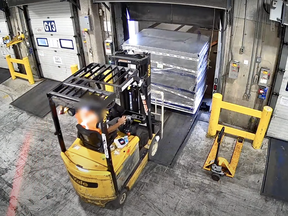Poorly completed paperwork on stolen load of gold bars and cash means airline only needs to pay general compensation as if it was a suitcase of clothes

In the messy aftermath of the Toronto airport gold heist — that saw $24 million in gold bars and cash driven away by thieves from an Air Canada warehouse — the airline has been ordered by the Federal Court to pay Brink’s transport company just $18,600 in compensation for their huge loss because of poorly completed paperwork on the stolen shipment.
Inside the shipping crate was currency from various countries being shipped from a Swiss bank to a currency exchange in Vancouver, valued at about $2,800,000 at today’s exchange rate, and gold bars from a metal refinery in Switzerland to the TD Bank in Toronto, valued at about $21,528,000.
Air Canada said the forms the company submitted had no value entered in the place where such a declaration is made for the airline’s use, only in a place meant for a declared value for a country’s customs agency.
In the exchange of paperwork between Air Canada and Brink’s when arranging the shipment, Brink’s stated “SPECIAL SUPERVISION IS REQUESTED VALUABLE CARGO” and the airline stated: “SHIPPER’S ATTENTION IS DRAWN TO THE NOTICE CONCERNING CARRIER’S LIMITATION OF LIABILITY. Shipper may increase such limitation of liability by declaring a higher value for carriage and paying a supplement charge if required.”

The stacks of cash were shipped in the same shipping crate as the gold but the shipment was booked separately.
It had similar paperwork, with Brink’s flagging the shipment on forms as “BANKNOTES–BANKNOTES-BANKNOTES” but with “NVD” (meaning, court heard, “no value declared”) in a box asking for “Declared Value for Carriage”.
After the shipping container was unloaded from the plane and placed in the warehouse awaiting pickup, Peel Regional Police allege the driver of a truck arrived, handed a real Air Canada waybill to an Air Canada employee and even though it said it was for a shipment of seafood that had already been collected, it nonetheless summoned the delivery of the crate of gold and cash by forklift. It was placed in the truck and the driver drove off.
When Brink’s guards arrived to collect the crate it was already gone, and nobody had even noticed.

Brink’s was suddenly out a lot of money. The company guarantees delivery of goods it ships and promises to pay companies for loss or stolen items.
Within weeks of the heist, Brink’s made good on its promises and paid a bank called Raiffeisen Schweiz 1,734,835 Swiss Francs and Valcambi SA, a precious metals refining company, US$14,988,920.58, court heard.
When Air Canada rebuffed its demand for full-value compensation, Brink’s filed a lawsuit.
Both sides were so confident in their position, each asked a Federal Court judge to issue a summary judgment in their favour, meaning a trial was not needed to adjudicate the dispute.
A lengthy written ruling by Justice Cecily Strickland was publicly released Thursday. She agreed the dispute could be settled by summary judgment.
“In this matter, the questions raised by both parties reflect the opposite sides of the same coin,” Strickland wrote.
It all came down to whether Brink’s had made a “special declaration of interest in delivery” and paid a supplementary fee for special handling, as mandated in the Montreal Convention for enhanced compensation. If not, the gold and cash would be treated the same as a box of used books or a suitcase of clothes.
Much of the 87 pages of Strickland’s judgment deals with language and meaning in international aviation treaties past and present, including comparing the English and the French versions, that had been parsed and argued in pre-trial evidence and cross-examinations of officials with both companies.

The Montreal Convention governs liability of air carriers and the extent of compensation for damages for all international commercial carriage of people, luggage, and cargo.
Although Strickland found Air Canada was responsible for compensating Brink’s on the cargo’s loss, she disagreed with Brink’s assessment of the amount.
While Brink’s notations in communication with Air Canada signalled that the company considered its shipment to be valuable, that does not meet the requirements of the Montreal Convention, because it does not include a specific monetary amount, Strickland ruled.
While monetary value was included in some documentation, it was in documents meant for border and customs agencies and not for carriage by the airline, she found.
“As Air Canada puts it, the declaration of value triggers how Air Canada will respond to the request for carriage, while declaring a value for Customs has little bearing on the carrier-shipper relationship,” her judgment said.
The evidence and jurisprudence leads to a finding that “a special declaration of interest means, or must include, the monetary value of the cargo,” Strickland wrote.
The total amount Air Canada was ordered to pay Brink’s in compensation for the loss of the gold and cash was 9,988 Special Drawing Rights, which is a fluctuating unit made up of a basket of international currencies.
At today’s exchange rate, that is about $16,400 for the gold and $2,200 for the banknotes, for a total of about $18,600.
Air Canada said it was a good ending.
“We are pleased with this decision by the court upholding our position on this matter,” Air Canada spokesman Peter Fitzpatrick told National Post.
Officials from Brink’s did not respond to requests for comment prior to deadline.
Our website is the place for the latest breaking news, exclusive scoops, longreads and provocative commentary. Please bookmark nationalpost.com and sign up for our daily newsletter, Posted, here.